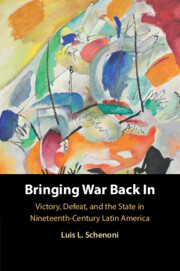2 - Classical Bellicist Theory
from Part I - Puzzle and Argument
Published online by Cambridge University Press: 14 November 2024
Summary
In this chapter I return to the classics of bellicist theory to formalize their insights and derive concrete observational expectations for nineteenth-century Latin America. I first look at the work of Otto Hintze and Max Weber, who suggest a more holistic approach to the effects of war on the process of state formation which combines both pre-war and post-war phases in a single overarching theory. I then use the more modern concepts and logics of historical institutionalism to generate clearer predictions from their theories. I propose that, in a pre-war phase and when hostilities are taking place, mobilization will trigger taxation and repression—i.e., the extraction-coercion cycle. Yet, war outcomes will determine whether those contingent policies will become institutionalized after the critical juncture of war. While victory will consolidate a trajectory of state formation, defeat will render state institutions illegitimate and set losers into a path-dependent process of state weakening. Finally, I discuss actors and mechanisms specific to nineteenth-century Latin America and lay out the observational implications of my argument.
Keywords
- Type
- Chapter
- Information
- Bringing War Back InVictory, Defeat, and the State in Nineteenth-Century Latin America, pp. 19 - 49Publisher: Cambridge University PressPrint publication year: 2024

